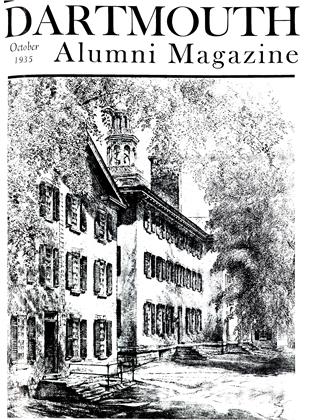By Edwin Richardson Frost '30. Published by Zoudervan.
When this book came to hand, pleasant memories came to mind. The author, a serious-minded young man attracted my attention in the classroom and increased it by revealing his desire to do literary work after graduation. I knew then that whatever he set his hand to do would be done in serious and thorough manner. That his urge should have led him to attack The Mystery of the Apostles came as a pleasant surprise and the book was opened with hesitating anticipation.
The main reason for this mood was the fact that only an occasional biblical scholar had essayed the task of writing either biographies or a book on the mystery of the twelve apostles, because of the limited historical material there is to work upon. The authors of the Gospels apparently did not have the biographical urge when bringing these twelve new men into their records. Some of them appear just long enough to disappear while only two or three have been given fuller notice. However records may be directly historical, and also indirectly; since relations are also historical records.
It is evident that the author feels that sufficient emphasis has not been placed upon this indirect material, so he chooses to employ a course with the accent of emphasis placed sharply on the esoteric approaches to the subject." A "literary presentation ' can go beyond "a charming story obvious both in form and content" 01
"the electric viewpoint of the early church theology."
This esoteric approach will be quite new to modern readers because the modern scientific historical method has relegated it to the forgotten past. It was bound however to reappear by the law of relativity, and it is of special interest that this revival has been effected by a religious layman imbued with literary instinct. If for no other reason the book should be widely read. All the good of one approach is not exhausted even if forgotten by any one generation.
Perhaps the most valuable side of this neglected approach will be found in the emphasis placed upon etymology. The author deserves great praise for bringing this material to the attention of ail age that is determined to forget the classics. The preacher will find here much that is suggestive and valuable. Other hidden or neglected interpretations will issue a challenge which will be most wholesome. More than one statement or opinion will arrest attention. The direct historical questions are not overlooked, and when on this ground the author may expect some doubters. There is a real charm in the literary style and in the spirit of the author. He has worked hard, lived with the material, sees with a vivid insight and closes his book with a richer experience. "Delving into the esoteric aspects of Religion has afformed a previous idea that Christianity is limitless in its boundaries, superb in its ideals and perfect in construction."
 View Full Issue
View Full Issue
More From This Issue
-
 Article
ArticleFRAGMENTS OF TRUTH
October 1935 By Ernest Martin Hopkins '10 -
 Class Notes
Class NotesClass of 1914
October 1935 By Edward Leech -
 Class Notes
Class NotesClass of 1911
October 1935 By G. Burleigh -
 Class Notes
Class NotesClass of 1910
October 1935 By Harold P. Hinman -
 Sports
SportsFOLLOWING THE BIG GREEN TEAMS
October 1935 By C. E. W. '30 -
 Article
ArticleFOOTBALL SQUAD "WELL ALONG"
October 1935
William H. Wood
Books
-
 Books
BooksGREAT MEN & WOMEN OF POLAND
February 1942 -
 Books
BooksFACULTY PUBLICATIONS
March 1942 -
 Books
BooksThe War Won?
November 1978 By FRANK SMALLWOOD '51 -
 Books
BooksLIFE ALONG THE CONNECTICUT RIVER.
June 1939 By Harold G. Rugg '06. -
 Books
BooksGEOLOGY OF VICTORIA ISLAND AND ADJACENT REGIONS,
February 1948 By J. W. Goldthwait. -
 Books
BooksPUBLICATIONS
January, 1923 By J.M.P.







